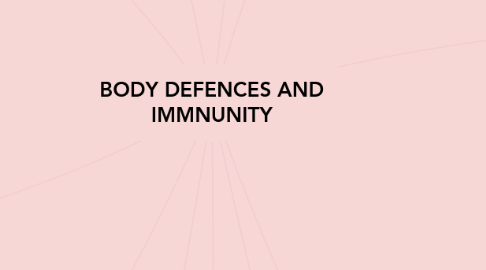BODY DEFENCES AND IMMNUNITY
by azlina idris


1. Disorders of Immune System
1.1. 1)Autoimmune Disease -self tolerance break down due : a)self reactive lymphocytes are normally silenced during development b) new self antigens appear due to gene mutation c)foreign antigens resembling self antigen triggers antibody that not only attacks foreign antigen but self antigen as well
1.2. 2)Hypersensitivities -allergies -IgE mistakes a harmless foreign substance for a dangerous invader and triggers runny nose, tears, itching, swelling
1.3. 3)Immunodeficiencies. -failure to immune system to respond adequately to a pathogen
2. Clinical Application Of immunity
2.1. 1)Vaccination -primary & secondary. *primary initial exposure to an antigen lag of several days before antibodies being produces. *secondary -reexposure to same pathogens triggers memory cells response 2)Monocional Antibodies -specific B-cell with desired antibodies is fused to cancer cell. 3)Organ transplants and rejection -blood transfusion usually need immunosuppressive drug therapy.
3. Effect Of Aging On Immune System
3.1. -Reduces immune responsiveness ▶️infection become more common and more serious. -number of autoantibodies increase with ages. ▶️more autoimmune disease
4. Neuroendocrine-Immune Interactions
4.1. -3 system are interconnected *Neural links- neuron innervate immune system organs such as spleen & lymph node *Chemical links- all 3 active chemicals neurotransmitters,hormones,lymphokines -One chemical can have effect in all 3 systems
5. 2 Different Kind Of Lymphocytes
5.1. 1)Antibody Mediated Immunity (AMI) ➡️Humoral Immunity ➡️Mediated by B lymphocytes (B-cells). ➡️involves the release of protein called Immunoglobin.
5.1.1. Classes Of Antibody Molecules ➡️ig A. ➡️ig D. ➡️ig E. ➡️ig G. ➡️ig M.
5.2. 2 Cell Mediated Immunity (CMI) ➡️Mediated by T lymphocytes ➡️involves a more diverse groupof cells than from AMI slower to respond ➡️Antigen are usually larger than AMI ➡️Contain antigen reseptor on their cells membrane
6. 2)Specific Immunity ↪️functionally the third lines of defences against of infections non innate but adaptive:
6.1. 1) carefully targeted -recoginzesa specific foreign substance
6.2. 2) amplifies the immune response, complements reactions
6.3. 3)systemic response
6.4. 4) has memory -protect you if you reinfected by the same pathogens
6.5. ANTIGENS ➡️any substance that can mobilize the immune system. Antigen processing➡️immune surveillance is a search for antigen and uses a large population of White Blood Cells LYMPHOCYTES. The Immune Response➡️involves the interaction of two major processes in the body
7. b)Internal Cells And Chemicals ➡️attempt to remove pathogens of they get past the barriers
7.1. 1)blood
7.2. 2)simple phagocytosis
7.3. 3)eosinophils
7.4. 4)natural killer cells
7.5. 5)inflammatory response
7.6. 6)fever
7.7. 7)complement reactions
7.8. 8)interferon
8. a)Physical And Chemical Barriers. ➡️ Work to prevent entry of pathogens
8.1. 1) intact skin
8.1.1. -contains bacteriocidal chemicals
8.1.2. -sebaceous glands provides protective film over skin
8.2. 2)mucous membrane
8.2.1. a)Mucus -thick,sticky,trap pathogens
8.2.2. b)Nose -nasal hairs help trap pathogens
8.2.3. c) Respiratory- cilia
8.2.4. d) stomach -lining secretes gastric juices
8.2.5. f) mouth -saliva allows continual flushing of bacteria to stomach
8.2.6. e) eye- protected by lacrimal apparatus
8.2.7. g) kidney - urine provides continual flushing of bacteria entering urethra
9. TWO KIND OF MECHANISMS THAT PROTECT OUR BODY
9.1. 1) Nonspecific Immunity- an innate reactions that acts as a general response against all kinds of pathogens
9.1.1. a) Physical And Chemical Barriers
9.1.2. b) Internal cells and Chemicals

